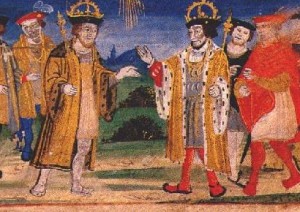 On 29th October 1532, according to Wynkyn de Word, Henry VIII accompanied Francis I to Morgison, situated seven miles outside of Calais, and bid farewell to him there. Francis I then carried on to Paris:
On 29th October 1532, according to Wynkyn de Word, Henry VIII accompanied Francis I to Morgison, situated seven miles outside of Calais, and bid farewell to him there. Francis I then carried on to Paris:
“And vpon the. xxix. daye of October the frensshe kynge departed fro Caleys to Parys ward and our kynge brought hym as ferre as Morgyson which is fro Caleys. vij. myle and so came to Caleys agayne.”
Chronicler Edward Hall dates the farewell to 30th October and writes:
“The morowe after beyng the thirtie daie of October, the two kynges departed out of Caleis, and came nere to Sadyngfeld, and there alighted in a faire grene place, where was a table set, and there the Englishemen serued the Frenchemen of wyne, Ypocras, fruite, & spice abondantly. When the two kynges had communed a litle, they mounted on their horses, and at the very enteryng of the French grounde, they toke handes, and with Princely countenaunce, louyng behauor, and hartie wordes, eche embrased other and so depart there departed.”
The main aim of the trip to Calais was for Henry and Anne to gain Francis I’s support for their union and in that they were successful. Francis was sympathetic to their plight and offered to give Henry French protection against Charles V, the Holy Roman Emperor and Catherine of Aragon’s nephew. As a result of his meeting with Henry VIII, Francis I wrote to the Bishop of Auxerre with instructions to talk to the Pope:
“Perceives from the language used by the king of England at their interview that he also is displeased at the way the Pope has acted in the matter of his marriage, and especially at the citation to appear at Rome, without sending judges to England. Every one knows that it has not been usual to compel kings to come to Rome. Both the Kings desire to inform the Pope more fully of their causes of complaint, so that he may remedy them for the future, and to have some persons present at the interview between the Pope and Emperor who can speak when affairs concerning them are discussed. Intends, therefore, to send the cardinals Tournon and Grammont speedily, with instructions. Desires him to inform the Pope of their coming, to send them news as often as possible, and to inform them of the time and place of the meeting.”
Of course, Henry VIII soon took it upon himself to forget the Pope and marry Anne regardless. Edward Hall writes of how the couple married on Thursday 14th November 1532, St Erkenwald’s Day, the day after they arrived back at Dover, and whether or not that is true they certainly began living like man and wife from that point on.
Notes and Sources
- The Maner of the tryumphe of Caleys and Bulleyn and The noble tryumphaunt coronacyon of Quene Anne, wyfe unto the most noble kynge Henry VIII, Wynkyn de Worde, p16
- Hall’s Chronicle, Edward Hall, p794
- George Boleyn: Tudor Poet, Courtier and Diplomat, Clare Cherry and Claire Ridgway, p139-140
- LP v. 1489
- Picture: Henry VIII and Francis I of France, manuscript, from http://www.marileecody.com/temporary/images.html